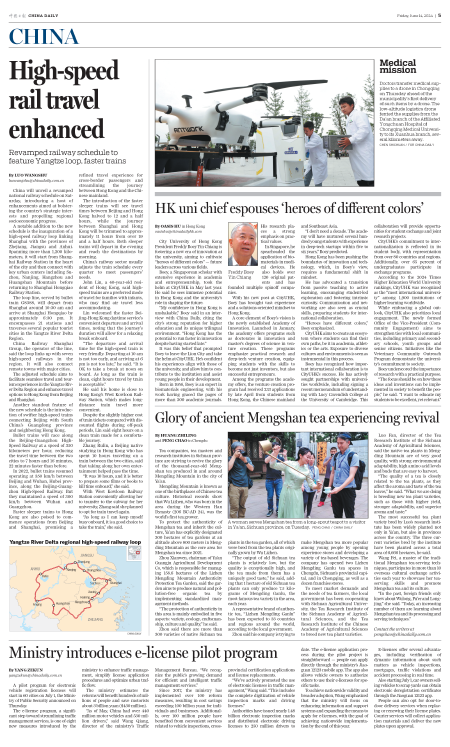
Freddy Boey Yin Chiang
City University of Hong Kong President Freddy Boey Yin Chiang is fostering a new era of innovation at the university, aiming to cultivate "heroes of different colors" — future leaders across various fields.
Boey, a Singaporean scholar with extensive experience in academia and entrepreneurship, took the helm at CityUHK in May last year. He said he sees immense potential in Hong Kong and the university's role in shaping the future.
"My confidence in Hong Kong is unshakable," Boey said in an interview with China Daily, citing the city's strong reputation for higher education and its unique trilingual environment. "Hong Kong has the potential to run faster in innovation despite having started late."
It was this belief that prompted Boey to leave the Lion City and take the helm at CityUHK. He's confident his experiences align with those of the university, and allow him to contribute to the institution and assist young people in their development.
Born in 1956, Boey is an expert in biomaterials engineering, with his work having graced the pages of more than 300 academic journals. His research places a strong emphasis on practical values.
In Singapore, he spearheaded the application of biomaterials in medical devices. He also holds over 120 original patents and has founded multiple spinoff companies.
With his new post at CityUHK, Boey has brought vast experience and a solutions-oriented mindset to Hong Kong.
A core element of Boey's vision is the newly established Academy of Innovation. Launched in January, the academy offers programs such as doctorates in innovation and master's degrees of science in venture creation. These programs emphasize practical research and deep-tech venture creation, equipping students with the skills to become not just inventors, but also successful entrepreneurs.
Among the programs the academy offers, the venture creation program had received 233 applications by late April from students from Hong Kong, the Chinese mainland and Southeast Asia.
"I don't need a decade. The academy will have nurtured several hundred young students with experience in deep-tech startups within five to six years," Boey predicted.
Hong Kong has been pushing the boundaries of innovation and technology, which, in Boey's view, requires a fundamental shift in mindset.
He has advocated a transition from passive teaching to active learning, encouraging student-led exploration and fostering intrinsic curiosity. Communication and networking are also seen as crucial skills, preparing students for international collaboration.
"Heroes have different colors," Boey emphasized.
CityUHK aims to create an ecosystem where students can find their own paths, be it in academia, athletics or the arts. Exposure to diverse cultures and environments is seen as instrumental in this process.
Boey has recognized how important international collaboration is to CityUHK's success. He has actively sought partnerships with universities worldwide, including signing a recent memorandum of understanding with Lucy Cavendish College at the University of Cambridge. This collaboration will provide opportunities for student exchange and joint research projects.
CityUHK's commitment to internationalization is reflected in its student body, with representation from over 80 countries and regions. Additionally, over 65 percent of undergraduates participate in exchange programs.
According to the 2024 Times Higher Education World University rankings, CityUHK was recognized as the "most international university" among 1,900 institutions of higher learning worldwide.
While embracing a global outlook, CityUHK also prioritizes local engagement. The newly formed Office of the Vice-President (Community Engagement) aims to strengthen ties with local communities, including primary and secondary schools, youth groups and senior citizens. Initiatives like the Veterinary Community Outreach Program demonstrate the university's commitment to society.
Boey underscored the importance of research with a practical purpose.
"The focus should be on how these ideas and inventions can be implemented in society to benefit the people," he said. "I want to educate my students to be excellent, yet relevant."
oasishu@chinadailyhk.com

